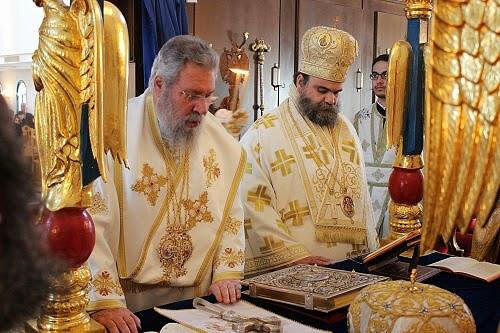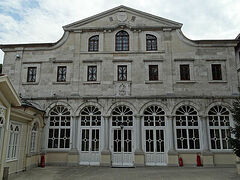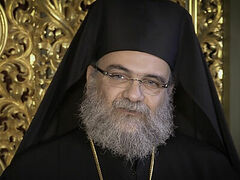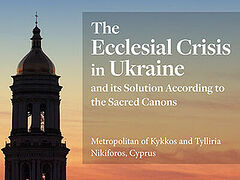Part 1: Metropolitan Isaiah of Tamassos, on All Aspects of the Ukrainian Question
Part 2: When You Love Someone, You Tell Him the Truth
His Eminence Metropolitan Isaiah of Tamassos and Orinis gave an interview to the Romfea Church news agency, which we have translated into English in three parts, frankly answering all the questions about his position regarding the actions of Constantinople, the West, and Moscow, and also commenting on the behavior of the Archbishop of Cyprus. In the end, Metropolitan Isaiah answered how, in his view, a resolution to the “Ukrainian question” could be reached.
 Met. Isaiah serving with Abp. Chrysostomos. Photo: philenews.com
Met. Isaiah serving with Abp. Chrysostomos. Photo: philenews.com
—Your Eminence, what do you think—why did the Archbishop make such accusations against you, which led you into direct conflict with the Ecumenical Patriarchate?
—All the unacceptable things that His Beatitude said about the Metropolitans of Kykkos and Limassol and me, the Metropolitans of Kykkos and Limassol answered with reasoned and ethical answers, and I subscribe to their remarks.
The same “divide and conquer” tactic was used by His Beatitude during the previous elections to the Archbishopric too. After accusing Metropolitan Athanasius of Limassol and warning us of the danger that would befall us if we chose him as Archbishop, he then proposed the candidacy of the Metropolitan of Kykkos as an alternative. Once he had managed to inflame the situation, he made a 180-degree turn and started accusing the Metropolitan of Kykkos. He called on the Metropolitan of Limassol to “stop Kykkos on the path to the Archbishopric,” because he was supposedly even more dangerous.
Then he dropped the Metropolitan of Limassol and, playing on the contradictions, returned the Metropolitan of Kykkos, whom he had previously expelled (he confirmed this with his public confession in an interview). As a result, the Archbishop asked the Metropolitan of Kykkos to give him his votes, to make a compromise decision to elect himself for a short term (five years), because, according to him, the Church was in danger.
You should know the rest from the media. The same thing happened again in this situation with the Ukrainian issue. After regularly criticizing what he said were the authoritarian actions and character of the Ecumenical Patriarch, with whom, according to the Archbishop, only he had the courage to speak directly, he continued to polarize the atmosphere in the Synod.
He denounced both the Phanariot policy and Russian implacability.
As for the Ukrainian question, Archbishop Chrysostom initially stated that Russia is the Mother Church for Ukraine, and he supported this position at the Synod until the situation became sufficiently tense.
The Archbishop initially agreed with us about the Ukrainian question and proposed that the Cypriot Church remain neutral—for the sake of Orthodox unity and for the sake of our national question. Knowing that this position was close to us and that in no case would we deviate from neutrality, he was sure he could make us collide with the Phanar if he suddenly switched sides.
Since the majority of the Synod members disagreed with this, he started poisoning our relations with the Phanar and the West, shamelessly accusing us both in political and ecclesiastical circles, and especially before Patriarch Bartholomew, of a supposed pro-Russian position for selfish purposes—a position that he himself earlier supported, including by sending letters to the Patriarch of Moscow, which have already been published.
Once the Archbishop was sure that the political situation was favorable for him and that the majority of the votes would be for his side, he unilaterally recognized the schismatic Epiphany, dealing a heavy blow to our own autocephaly and our synodal system.
And again, just as in the archepiscopal elections, he belittled his opponents and created an environment that would help his chosen ones succeed to the archepiscopal throne.
—Your Eminence, how do you feel today after all of this, and what, in your opinion, must be done to ensure that Orthodoxy not be divided and that all the Churches would return to their former peaceful coexistence? People aren’t aware of the internal affairs of the Local Churches and so they’re bewildered seeing you argue. In a few words, explain for us how we got to this point, because the Church leaders know Church history and its laws. And finally, how can we solve this problem?
—My dear, I have told you the whole truth as I perceive and understand what is happening, and so I outline these events with a clear conscience.
My feelings were wonderfully expressed by Archbishop Anastasios of Albania. Let me remind you of his position. In his interview with the Athens newspaper Kathimerini, the primate of the Albanian Church said:
The initiatives in Ukraine, after two years already, obviously did not yield the desired therapeutic effect. Neither peace nor unity was achieved for the millions of Ukrainian Orthodox. Instead, controversy and division spread to other Local Orthodox Churches… Time only worsens the trauma. The serious danger for Orthodoxy here is completely obvious: an ethnophyletistic schism (into Greeks, Slavs, and those who desire harmonious relations with everyone), which negates the multi-cultural character of Orthodoxy and its universal character. This is the greatest danger, not only for Orthodoxy, but for all of Christianity, and every possible effort must be made from all sides to eliminate it as quickly as possible… I confess that I continue to suffer when I cannot agree with my dear and respected brethren, but I am cannot ignore obvious facts and basic Orthodox principles.
I suffer just as much.
My dear, those who are not close to the Moscow Patriarchate draw hasty conclusions because they judge it just as one of the cogs in Russia’s foreign policy mechanism. But that’s not true. The Russian Orthodox, as well as the Greek, are oppressed and persecuted by the godless of this world.
They only recently escaped the persecution of communism. Therefore, they have every reason to fear the authorities and act with great caution.
Of course, they make mistakes, but they are by no means enemies of our faith.
I lived side-by-side with them for ten whole years as a student and priest, and I’ve been in contact with them for twenty-eight years overall, fulfilling the obedience of our Local Church.
They were arrested and shot; they [anti-Christian forces] tried to wipe them from the face of God, but God, as with the Greeks, did not allow this.
Just like the Phanar, they had to survive in difficult conditions. Every Local Church supports its homeland; but, of course, it shouldn’t go beyond the bounds of Orthodox theology and ecclesiology. I think some today have crossed the “red line” and gone beyond the limits of what is permissible.
I know hundreds of people whose ancestors were brutally tortured by the Soviet regime.
I have been and continue to be in close contact with pious clergy and laity who have fought and are fighting for the purity of the faith, and continue to fight and confess Orthodoxy.
Of course, they should, like the Phanariots, be careful in their contact with the state authorities; and our task is to find a way to cooperate and live together with them without harming each other.
I know many hierarchs, clergy, and laity in Russia who really love Greece. And just like us on Cyprus, they feel great pain when our primates try to persuade us to side with one or the other, as though it were a political struggle and not the common future of Orthodoxy that concerns us all.
Neither the Ecumenical nor the Moscow Patriarchates should allow non-ecclesiastical centers of interest to use us however they please and introduce “divisions” into our relations, splitting Orthodoxy into two. Such behavior is disrespectful to the martyrs and saints. As Archbishop Anastasios of Albania wisely noted, this is the greatest danger to Orthodox unity.
On the Ukrainian issue, we have indicated our position and disagreed with the views of some others. This happens sometimes with all people and in all organizations.
We also believe the Moscow Patriarchate’s refusal to attend the Holy and Great Council on Crete was a huge mistake. This could have confirmed the Ecumenical Patriarch’s fears that they want to deprive him of his primacy of honor, which would mean the existence of the Ecumenical Patriarchate would be under threat.
I repeat, and everyone should understand this: The Ecumenical Patriarchate, acting as the coordinator between the Local Orthodox Churches in universal Orthodoxy, enjoys the support of the West and survives in Turkey thanks to the recognition of and support for its authority on the international level. We want this support to continue to be there in the future.
The Russian Church, however, refrained from participating in the Crete Council and threw a double challenge to the Ecumenical Patriarchate (to which its reaction testifies, in our view).
As has been explained to us in the back rooms of the Patriarchate: first, the Ecumenical Patriarch felt that his fervent desire to hold a pan-Orthodox council was not respected; he perceived it as a betrayal and abuse of his trust, as they had promised to attend the council.
Second, the Russian Church’s refusal was interpreted as a rude act, calling into question the privileges and significance of the Ecumenical Patriarchate, and a belittling of its role of international coordinator in our time.
This step, as the Phanariot circles explained to me, was considered hostile, and the offended Ecumenical Patriarch felt that if he didn’t react immediately, the Moscow Patriarchate would deal a crushing blow to his authority, which would jeopardize the survival of the Ecumenical Patriarchate in the long term.
The international clique of interested persons was ready for the events that took place and helped the Ecumenical Patriarch, but, as it turned out later, this affected Orthodox unity.
There is, of course, another side to the coin. We’ve already discussed this when we laid out our position on the Ukrainian issue.
For many years, the Ecumenical Patriarchate enjoyed pan-Orthodox authority and recognition, not only because of its privileges, but also, to a much greater extent, because of its actions at the international level and because of its friendly relations with its brothers in the Church. Everyone recognized its privileges and took part in the dialogues it coordinated because they trusted it. The reliability and impartiality of the representatives of the Ecumenical Patriarchate created a sense of trust and tranquility in the bosom of Orthodoxy.
I believe the way in which the Ukrainian issue was resolved in these international geopolitical circumstances has seriously affected the question of trusting the Patriarchal institution, which must now find a way to rectify the situation.
Additionally, if we all now allow our Churches to be used as instruments, based on our states’ interests, then we will become like the Vatican state, we will turn into secular religious groups, and thereby cease being the Church of Christ.
The secular world seeks to devour us like a roaring lion (1 Pt. 5:8) and rob us of our sanctity. This is the greatest danger, much greater than this accursed separation.
We must never allow this to happen. The time has come to take responsibility, to agree with one another and save the ship of Orthodox unity, in the name of our Lord Jesus Christ, Who unites us all. We are brothers in Christ. We are all one family.
We are largely united spiritually, and only slightly divided by secular things.
We must rebuild our relations on the foundation of our common service to God and our conciliar system, our Orthodox theology and ecclesiology. We must all forgive one another and take responsibility for what is happening.
It’s gotten to a point where building churches is considered a “sin,” because some people interpret it from a political point of view.
It’s gotten to a point where supporting our brothers in Christ who live in our homeland is seen as a political step rather than a spiritual obligation. Alas! Where are we headed, my dears?
We have become a laughing stock for our enemies who mock our moral decline. As an Orthodox bishop, I don’t consider myself infallible, but I don’t agree with those who say I strive for anything other than the preaching of the Orthodox faith of the Gospel, and I don’t tolerate accusations of having other interests other than those I vowed to serve before the Holy Altar during my episcopal consecration.
I know that it’s hard to prove your true intentions when there’s such a clash of interests. But I will speak about them in words and prove them with my real actions, accompanied by prayer.
Orthodoxy is the greatest gift in our lives, and we insult it with our behavior.
Our task is to introduce all people to Christ, that He might be present in their everyday lives; to feed the flock entrusted to us in the spirit of Gospel love and compassion, championing the abolition of discrimination and various addictions; and to coordinate the humanitarian mission of the Church, both on the local and global level. To do this, we must first forgive one another, and then we will be able to work together in our pastoral and social ministry and tirelessly fight for the truth.
The Ukrainian question and the conflict between these two Local Churches could be resolved thanks to their love for our holy Orthodoxy.
If the two primates could keep their composure and discuss their differences in private, they would certainly find a way to soften the confrontation that has arisen.1
They could very well agree on a common strategy for de-escalating the conflict and, together with their working groups, develop scenarios for a settlement and peaceful coexistence within the framework of a theological economy acceptable to all.
And after they come to an agreement with one another, they should call a pan-Orthodox council that we might all agree together and become even stronger than before, and thrive in love and joint service to God and man.
Every time Orthodoxy faces serious international problems, its distinctive qualities remain loyalty to God and the spiritual life.
Even now, during this trial for our Orthodox faith and Sacred Tradition, we mustn’t fail if we want to convince others of the truth and holiness of the Orthodox faith.
Perhaps this trial we are undergoing now will give us the opportunity for a spiritual rebirth for the entire Church, and for every one of us. God will help us if we first take care of the purification and salvation of our immortal souls.
Cicero once wrote: “It’s hard to be silent when you’re in pain.” Sick at heart and worried about the future of Orthodoxy, I listen to the voice of my episcopal conscience and submit myself to the judgment of God and our descendants.




